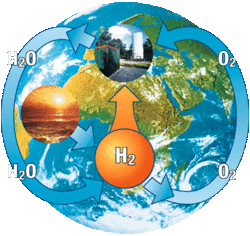It’s cloudy over Georgia today. Heavy clouds but no rain.
The drought continues. Politicians are panicking. Without rain Lake Lanier, which supplies the region with most of its water, will be sucked-dry in three months. (Picture from the blog Tondee’s Tavern, via Voic.us.)
What does this have to do with hydrogen energy? Plenty.
When you use hydrogen in a fuel cell, combining it with oxygen from the air to produce energy, the "pollution" you produce is water. It’s pure water, but even if you run it through a drain it’s still new water, created in direct proportion to where people are.
This is an important point to note as we go through the first phase of
hydrogen skepticism, which was started by environmentalist Joseph Romm (left) and his book The Hype About Hydrogen.
Romm’s point is that, with our present systems for producing hydrogen
from natural gas and our present fuel cell technologies, hydrogen cars
are a myth.
In the very short term, he is right. Just as an author writing
in 1906 could pooh-pooh the idea of a gasoline-powered car industry,
noting that we lacked the proper infrastructure for it. Clean hydrogen
infrastructure must still be built.
Unfortunately, as Greg Blencoe of Hydrogen Discoveries notes in his blog,
many lazy people use Romm’s argument to support useless alternatives to
hydrogen, such as biodiesel or oil itself. Romm has become a useful
idiot for energy industry propaganda, whether he wanted to be or not.
And to Blencoe’s cogent arguments destroying
Romm’s myths, add this. Hydrogen pollution will solve all droughts, if
it’s just collected and used. If all the cars driving around Atlanta
today were powered by hydrogen, there would be no drought.
It’s true that, in order to create enough hydrogen to power cars as
well as our electrical grid, we have to exploit all our green energy
potential. Sunlight is everywhere, wind is everywhere, but geothermal
potential is spread unevenly. The Earth’s heat is much closer to the
surface in the West than in the East. Electrical demand is much higher
in the East than in the West.
How many geothermal plants, producing hydrogen from the excess fuel on
local grids, will we need to power how many cars? How will we balance
that supply with growing demand? Can we make that model work with
eastern power plants — if Sun and wind are powering the grid can’t
they be producing hydrogen as-needed?
These are technical questions, engineering questions, economic
questions, and political questions. They are not scientific questions. The science of hydrogen
is sound. All we need to do, in order to solve all our problems, is get
to work on these questions, and make answering them them our highest priority.
We don’t need to argue with Joseph Romm, or anyone else. We need to
act. We need to invest. And we need to plan for growing hydrogen
demand, which comes on alongside growing hydrogen supply.
That’s why we need a War Against Oil. It’s the intense collective
effort of winning a war, solving what seem to be unsolvable problems (such as
those Romm posits) that we need in order to succeed.
Considering that all life on Earth is on the line here, is not the effort worthwhile?














Even if we had a Manhattan project for automotive hydrogen, how quickly could this be made the majority fuel type? 10 years? 20 years? Without the Manhattan project, it will likely take more like 40 years. You don’t think something like biodiesel has a role to fill in the meantime? A mandate that all new cars be diesel would hurt manufacturers not at all — the R&D is long since done. Existing filling stations could easily be converted to mostly diesel (no way you’re going to get all petrol cars off the road in less than 20 years). I agree biodiesel is no alternative to hydrogen, but that doesn’t mean it couldn’t be a useful fuel in the short term.
Even if we had a Manhattan project for automotive hydrogen, how quickly could this be made the majority fuel type? 10 years? 20 years? Without the Manhattan project, it will likely take more like 40 years. You don’t think something like biodiesel has a role to fill in the meantime? A mandate that all new cars be diesel would hurt manufacturers not at all — the R&D is long since done. Existing filling stations could easily be converted to mostly diesel (no way you’re going to get all petrol cars off the road in less than 20 years). I agree biodiesel is no alternative to hydrogen, but that doesn’t mean it couldn’t be a useful fuel in the short term.
This is a very insightful and balanced perspective about hydrogen. The world is making steady progress and taking tangible steps toward a hydrogen-based economy. In fact, some hydrogen technologies are currently being utilized to power cell phone towers and in specialty transportation such as fork lifts – just to name a few applications. However, in order to continue moving toward a hydrogen economy, the private and public sectors must work together to not only support research in the hydrogen community, but to continually educate the world as to how and why hydrogen is the best long-term option for addressing our energy needs.
At the National Hydrogen Association, we are working diligently to help people gain a greater understanding about the benefits of hydrogen, and how a hydrogen-based economy will positively impact the environment, national security and reduce foreign energy imports. Hydrogen, when utilized in its purest form and produced from renewable sources, is clean with water as the only by-product.
It is easy to forget how quickly science and technological developments can change and evolve. At the turn of the twentieth century, few people could imagine that we would fly, but we achieved something greater by going to the moon. Who could have imagined in 1969 that we would have the ability to carry a phone and talk to virtually anyone, anywhere, and that it would include a camera to take photographs or record video? Only with public support can we achieve a hydrogen-based society.
In the meantime, please visit the National Hydrogen Association website at http://www.hydrogenassociation.org, the premier source for information on hydrogen and hydrogen technologies.
This is a very insightful and balanced perspective about hydrogen. The world is making steady progress and taking tangible steps toward a hydrogen-based economy. In fact, some hydrogen technologies are currently being utilized to power cell phone towers and in specialty transportation such as fork lifts – just to name a few applications. However, in order to continue moving toward a hydrogen economy, the private and public sectors must work together to not only support research in the hydrogen community, but to continually educate the world as to how and why hydrogen is the best long-term option for addressing our energy needs.
At the National Hydrogen Association, we are working diligently to help people gain a greater understanding about the benefits of hydrogen, and how a hydrogen-based economy will positively impact the environment, national security and reduce foreign energy imports. Hydrogen, when utilized in its purest form and produced from renewable sources, is clean with water as the only by-product.
It is easy to forget how quickly science and technological developments can change and evolve. At the turn of the twentieth century, few people could imagine that we would fly, but we achieved something greater by going to the moon. Who could have imagined in 1969 that we would have the ability to carry a phone and talk to virtually anyone, anywhere, and that it would include a camera to take photographs or record video? Only with public support can we achieve a hydrogen-based society.
In the meantime, please visit the National Hydrogen Association website at http://www.hydrogenassociation.org, the premier source for information on hydrogen and hydrogen technologies.